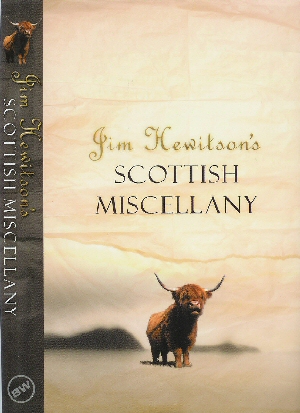Edited by Frank R. Shaw, FSA Scot, Atlanta, GA, USA
 For
years, Jim Hewitson has been one of Scotland’s best writers. His
book, Tam Blake & Co: The Scots in America, became a favorite
of mine when it was recommended to me in 1996 my wonderful North
Carolina cousin, Floridel Bristow. It was a best seller then and is
still selling strong today. Word on the street has it that Jim has
been a journalist, lobster fisherman, gypsy, author, graveyard
grass-cutter, broadcaster and light laborer. (Gypsy? Light laborer?
Oxymoron?) Jim says he is currently an immature student at the
University of Aberdeen. He worked at The Herald for 25
years and is the author of Scotching the Myths: An Alternative
Route Map to Scottish History; Clinging to the Edge: Journals from
an Orkney Island; Astonishing Scotland: A Cheeky Thesaurus of
Scottishness; Rebecca the Raccoon; Far Off in Sunlit Places: The
Scots in Australia and New Zealand, and the now popular
Jim Hewitson’s Scottish Miscellany from which I have
received permission from the author to use in this column. He has
two books due out this year: The Scots at Sea and
A Book of the Dead. For
years, Jim Hewitson has been one of Scotland’s best writers. His
book, Tam Blake & Co: The Scots in America, became a favorite
of mine when it was recommended to me in 1996 my wonderful North
Carolina cousin, Floridel Bristow. It was a best seller then and is
still selling strong today. Word on the street has it that Jim has
been a journalist, lobster fisherman, gypsy, author, graveyard
grass-cutter, broadcaster and light laborer. (Gypsy? Light laborer?
Oxymoron?) Jim says he is currently an immature student at the
University of Aberdeen. He worked at The Herald for 25
years and is the author of Scotching the Myths: An Alternative
Route Map to Scottish History; Clinging to the Edge: Journals from
an Orkney Island; Astonishing Scotland: A Cheeky Thesaurus of
Scottishness; Rebecca the Raccoon; Far Off in Sunlit Places: The
Scots in Australia and New Zealand, and the now popular
Jim Hewitson’s Scottish Miscellany from which I have
received permission from the author to use in this column. He has
two books due out this year: The Scots at Sea and
A Book of the Dead.
In a recent email, Jim
wrote: “If you and any of your friends, family and acquaintances are
coming to Scotland, Morag and I run a homely wee bed and breakfast.
Cheap rates for old pals!” I’m sure we will take him up on it
sometime in the future, but I hope all 70,000+ subscribers of
The Family Tree do not show up at the same time. Welcome,
Jim Hewitson, to our wee column on Robert Burns Lives!
Ca’ Canny wi’ the
Satire, Robbie!
By
Jim Hewitson
Three lawyers’
tongue, turned inside out,
Wi’ lies seamed like a beggar’s clout;
Three priests’ hearts, rotten, black as muck,
Lay stinking, vile, in every neuk.
-- Robert Burns
These are four lines excised from the original version of “Tam o’
Shanter” and they are seldom, if ever, seen nowadays. Robert Burns
is such a national hero, a legendary Scottish icon, that it’s
occasionally nice to hear that he was fallible and happy to be
guided, just like the rest of us.
In
the year 1793, “Tam o’ Shanter”, arguably his most famous and
well-beloved poem, underwent a strange, if minor, makeover which
involved something uncomfortably like an accommodation of political
correctness.
In 1791, Alexander Fraser
Tytler, an Edinburgh advocate, Professor of Universal History at
Edinburgh University and a man of letters, got hold of a sheet of
Grose’s Antiquities in which was printed the very first
public version of “Tam o’ Shanter”. He was already familiar with
Burns and wrote a letter to the poet praising the work in glowing
terms, particularly the bard’s description of the witches’ Sabbath
in Kirk Alloway in which he said Burns displayed “a power of
imagination that Shakespeare himself could not have exceeded.” His
blood, he declared, had run cold on reading these stanzas and he
predicted that Burns would go on to eclipse the greatest poets of
his day.
Ah, but, the learned
professor did have one little reservation. In the scenes when Burns
is describing the paraphernalia of the Sabbath, the bard turns his
wit briefly on the legal profession and the clergy. Said Tytler:
The descriptive part might perhaps have been better
closed than the four lines which succeed, which, though good in
themselves, yet, as they derive all their merit from the satire they
contain are here rather misplaced among the circumstances of pure
horror.
Burns responded by letter
and resolved that “the hit at the lawyer and the priest, I shall cut
out”. When the 1793 edition of the poem appeared, the offending
lines were missing.
In a first draft, that was
also cut, Burns had criticised doctors too. Thomas Crawford, an
expert on the work of Burns, says that this group of professional
people were stock figures who were regularly the butt of
eighteenth-century social criticism.
In conclusion, it is the
opinion of many today that not much has changed. (FRS: 6-26-04) |

